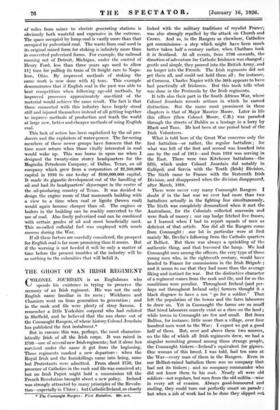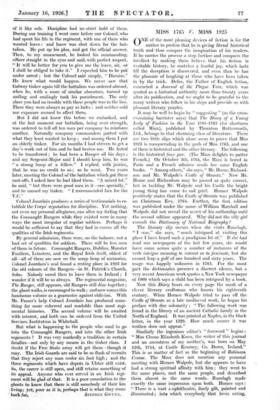THE GHOST OF AN IRISH REGIMENT
COLONEL JOURDAIN is an Englishman who spends his existence in trying to preserve the memory of an Irish regiment. His was not the only English name familiar in its mess ; Wickhams and Chamiers went on from generation to generation ; and in the rank and file were plenty of stray Saxons. I remember a little Yorkshire corporal who had enlisted in Sheffield, and he believed that the sun shone out of the Connaught Rangers, of whose history Colonel Jourdain has published the first instalment.* But in essence this was, perhaps, the most character- istically Irish of all the Irish corps. It was raised in 1798—one of several new Irish regiments ; but it alone has survived under the name it got from the beginning. These regiments marked a new departure : when the Royal Irish and the Inniskillings came into being, none but Protestants were admitted. From about 1750, the presence of Catholics in the rank and file was connived at; but no Irish Papist might hold a commission till the French Revolution brought about a new policy. Ireland was strongly attracted by many principles of the Revolu- tion—especially in Ulster ; but Catholic Ireland, so closely • The Connaught Rangers : First Battalion. 60s. net. linked with the military traditions of royalist France; was also strongly repelled by the attack on Church and Crown. And so, in the Rangers as elsewhere, Catholics got commissions—a step which might have been much better taken half a century earlier, when Chatham took it in Scotland. At all events, from 1798 onwards, the direction of adventure for Catholic Irishmen was changed ; gentle and simple, they poured into the British Army, and no longer into the French. The Irish regiments did not get them all, and could not hold them all ; for instance, at Coruna, Charles Napier with the 50th appears to have had practically all Irishmen. But this book tells what was done in the Peninsula by the Irish regiments.
It tells also their part in the South African War, where Colonel Jourdain records actions in which he earned distinction. But the name most prominent in these chapters is that of Major Maurice Moore. Later in life this officer (then Colonel Moore, C.B.) was paraded through the streets of Dublin as a hostage in a lorry by Black and Tans. He had been at one period head of the Irish Volunteers.
What is told here of the Great War concerns only the first battalion—or rather, the regular battalion ; for what was left of the first and second was knocked into one by the end of 1914—and from 1916 was serving in the East. There were two Kitchener battalions—the fifth, which under Colonel Jourdain did notably in Gallipoli and Servia with the Tenth (Irish) Division. The Sixth came to France with the Sixteenth Irish Division, and disappeared when the division disappeared, after March, 1918.
There were never very many Connaught Rangers. I doubt if in the last war we ever had more than two battalions actually in the fighting line simultaneously. The Sixth was completely demoralized when it met the Australians, for the Colonials collected souvenirs and were flush of money ; our cap badge fetched five francs, as I learned when I had to report squads of men as deficient of that article. Nor did all the Rangers come from Connaught : our lot in particular were at first mainly Mr. Devlin's following from the Catholic quarters of Belfast. But there was always a sprinkling of the authentic thing, and that leavened the lump. We had Connaught men among the officers, the very type of those young men who, in the eighteenth century, would have headed to France for commissions in the Irish Brigade ; and it seems to me that they had more than the average liking and instinct for war. But the distinctive character of a regiment comes from the rank and file, and for us the conditions were peculiar. Throughout Ireland (and per- haps not throughout Ireland only) farmers thought it a black disgrace to have a son " go for a soldier." That left the population of the towns and the farm labourers to draw on. Yet in Connaught the farms are so small that hired labourers scarcely exist as a class on the land ; while towns in Connaught are few and small. But from Ballina, for instance, little more than a village, over four hundred men went to the War: I expect we got a good half of them. But, over and above these two sources, on the like of which all Irish regiments drew, we had a singular recruiting ground among those strange people, the Connaught tinkers—Ireland's equivalent for gipsies. One woman of this breed, I was told, had ten sons at the War—every man of them in the Rangers. Even in our Belfast-raised battalion. there was no company that had not its tinkers ;. and . no company commander who did not know them. to his cost.. Nearly all were old soldiers—not regulars, but men from the old militia—wise in every art of evasion. Always good-humoured and smiling, they could turn out perfectly smart on parade ; but when a job of work had to be done they slipped out of it like eels. Discipline had no strict- hold of them. During our training I went once before our Colonel, who had spent his life in the regiment, with one of them who wanted leave : and leave was shut down for the bat- talion. He put up his plea, and got the official answer. Then, to my amazement, he looked his commanding, Officer straight in the eyes and said, with perfect respect, It will be better for you to give me the leave, sir, or I shall be obliged to take it." I expected him to be put Under arrest ; but the Colonel said simply, " Dismiss." He knew what would happen. We never saw that Galway tinker again till the battalion was ordered abroad, when he, with a score of similar absentees, turned up smiling and smilingly took his punishment: The - only place you had no trouble with these people was in the line. There they were always as gay as larks and neither cold nor exposure seemed to affect them.
But I did not know this before we embarked, and at the last moment our battalion, being over strength, was ordered to tell off ten men per company to reinforce another. Naturally company commanders parted with what they least wanted to keep ; and among them I put an elderly tinker. For six months I had striven to get a day's work out of him and he had beaten me. He hated to be transferred ; he had been a Ranger all his days ; and my Sergeant-Major said I should keep him, he was " a strong lump of a fellow." I replied, with justice, that he was no credit to us ; so he went. Two years later; meeting the Colonel of the battalion which got these cast-offs, I asked how he had liked them. "A mixed lot," he said, " but there were good men in it—one specially," and-he named my tinker. " I recommended him for the V.C." - Colonel Jourdain produces a series of testimonials to es- tablish the Corps' reputation for discipline. Yet nothing, not even my personal allegiance, can alter my. feeling that the Connaught Rangers while they existed were in many ways the most irregular of regular soldiers. Perhaps it Would be sufficient to say that they had in excess all the qualities of the Irish regiments.
By general admission, these were, on the balance, not a bad set of qualities for soldiers. There will be less seen of them in future. Connaught Rangers, Dublins, Munster Fusiliers, Leinsters, and the Royal Irish itself, oldest of all—all of them are now on the scrap heap of memories. Colonel Jourdain's zeal found a resting place in 1922 for the old colours of the Rangers—in St. Patrick's Church, Soho. Nobody cared then to have them in Ireland ; I wonder if it will be so always. The regimental magazine, The Ranger, still appears, old Rangers still dine together ; the ghost walks, is-encouraged to walk; and now comes this handsome volume as a guarantee against oblivion. With Mr. Fraser's help Colonel Jourdain has -produced some- thing far more coherent and readable than most regi- mental histories. The second volume will be awaited with interest, and both can be ordered from the United Services Institution in Whitehall.
But what is happening to the people who used to go into the Connaught Rangers, and into the other Irish regiments ? It was very markedly a tradition in certain families—not only by any means in the tinker class. I doubt if the Free- State army will get them—though it may. - The Irish Guards are said to be so flush of recruits that they reject any man under six foot high ; and the three regiments which -have depots in Ulster still exist.
So, the career is still open, and still retains something of its appeal. Anyone who ever served in an Irish regi- ment will be glad of that. It is a poor consolation to the ghosts to know that there is still somebody of their kin living; yet, poor as it is, perhaps that is what they come















































 Previous page
Previous page